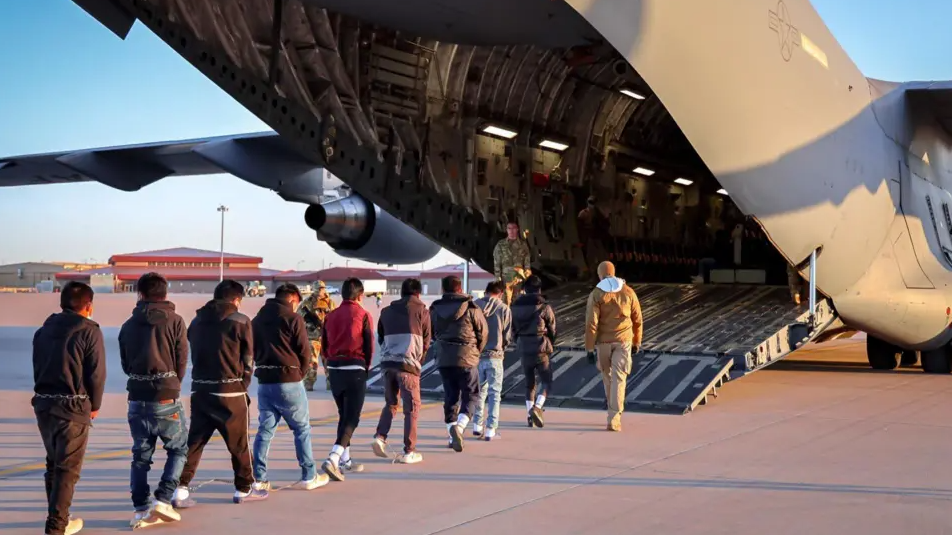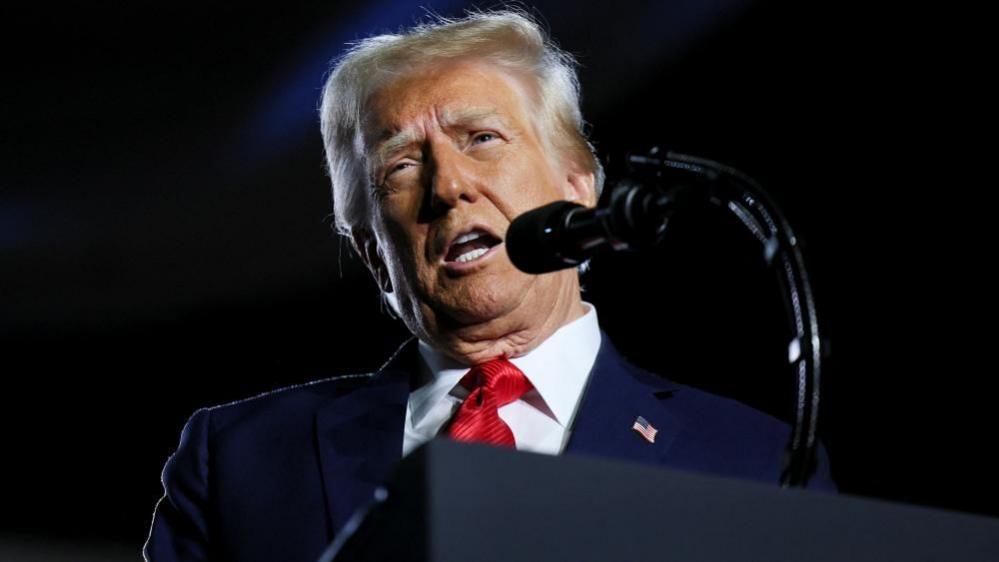Colombia yields on US deportation flights to avert trade war
Watch: A look at the US-Mexico border on Trump's first week in office
- Published
A looming trade war between the US and Colombia appears to have been averted after the Colombian government agreed to allow US military flights carrying deported migrants to land in the Andean country.
The spat erupted on Sunday when President Gustavo Petro barred two military planes carrying Colombians deported from the US from landing.
The Trump administration responded by threatening to slap punitive tariffs on Colombian exports to the US.
President Petro at first said Colombia would retaliate by imposing tariffs on US goods, but the White House later announced that Colombia had agreed to accept migrants - including those arriving on US military aircraft - "without limitation or delay".

Trump's press secretary Karoline Leavitt posted this picture on X on 24 January announcing that deportation flights had begun
The White House hailed the agreement with Colombia as a victory for Trump's hard-line approach, after the countries' two leaders had exchanged threats on social media on Sunday.
"Today's events make clear to the world that America is respected again," White House press secretary Karoline Leavitt wrote in a statement.
She added that the tariffs and sanctions which the Trump administration had threatened to impose on Colombia, should it not comply, would be "held in reserve, and not signed, unless Colombia fails to honour this agreement".
She also said that President Donald Trump "expects all other nations of the world to fully co-operate in accepting deportation of their citizens illegally present in the United States".
A cornerstone of Trump's immigration policy is removing unlawful migrants from the US, with the promise of "mass deportations".
Rapid escalation
The row between Colombia's left-wing president and Trump escalated rapidly on Sunday.
Petro, a keen user of social media, posted on X that he had "barred US planes carrying Colombian migrants from entering our territory" because "the US can't treat Colombian migrants like criminals".
He demanded that the US put procedures in place for migrants to be "treated with dignity".
He also said he was ready to send the presidential plane to the US to transport the migrants.
Colombia has accepted deportation flights from the US in the past. In 2024, 124 planes carrying deported migrants from the US landed in the country.
But President Petro appeared to object to the return of deportees on military rather than civilian flights - and to the way the migrants may be treated on those military flights.
In his posts on X, Petro referenced a news video showing migrants deported from the US to Brazil, who had been handcuffed and had their feet restrained during the deportation flight.
He said that he would "never allow Colombians to be returned handcuffed on flights".

Donald Trump had ordered 25% tariffs on all Colombian goods
Petro's refusal to let two US military planes carrying Colombian deportees to land triggered a quick response by Trump on Truth Social.
"I was just informed that two repatriation flights from the United States, with a large number of Illegal Criminals, were not allowed to land in Colombia. This order was given by Colombia's Socialist President Gustavo Petro, who is already very unpopular amongst his people," he wrote.
Trump argued that Petro's denial of these flights had jeopardised the national security and public safety of the US.
He said he had directed his administration to "immediately" impose 25% tariffs on all Colombian goods coming into the US, which he said would be raised to 50% if Colombia did not comply within a week.
He also said he had imposed a travel ban and revoked the visas of Colombian government officials "and all allies and supporters".
In his post, he warned that "these measures are just the beginning".
Petro responded on X with a long, rambling but ultimately defiant post in which he said he would match any US-imposed tariffs.
"Your blockade does not scare me, because Colombia, besides being the country of beauty, is the heart of the world," he wrote.
Meanwhile, members of Petro's administration worked behind the scenes to defuse the row.
In a late-night news conference, Foreign Minister Luis Gilberto Murillo announced that the two countries had "overcome the impasse" and that Colombia would accept returned citizens.
While Murillo did not directly refer to the White House statement, according to which Colombia had agreed to allow US military flights to take the deportees back, he did not deny it either.
The foreign minister reiterated Colombia's offer to send its presidential plane to the US to transport the deportees.
While the Colombian concession seems to have averted the looming trade war, the US has said that visa restrictions on Colombian government officials would stay in place until the first planeload of deportees landed in Colombia.
Colombians arriving at US airports will also undergo greater scrutiny under the measures imposed on Sunday, the Trump administration said.
Colombia's foreign minister said he would travel to Washington "in the coming days" for high-level meetings with administration officials.
The row marks a low point in relations between the two countries, which historically have been allies and co-operated closely in the fight against drug trafficking, with the US providing billions of dollars in military aid and training to Colombia's security forces.
Punitive tariffs such as those threatened by Trump and Petro would have hurt both Colombian producers and US consumers.
Trade between the two countries was worth $53.5bn (£42.8bn) in 2022, according to the US Office of the US Trade Representative, external.
Colombia's main exports to the US are oil, coffee and cut flowers.
Democrat Congresswoman Alexandria Ocasio-Cortez urged Americans to "remember: we pay the tariffs, not Colombia".
"Trump is about to make every American pay even more for coffee," she wrote before the tariffs had been suspended.
Trump imposes 25% tariffs on Colombia as deported migrant flights blocked
- Published26 January

Follow the twists and turns of Trump's second presidential term with North America correspondent Anthony Zurcher's weekly US Politics Unspun newsletter. Readers in the UK can sign up here. Those outside the UK can sign up here.